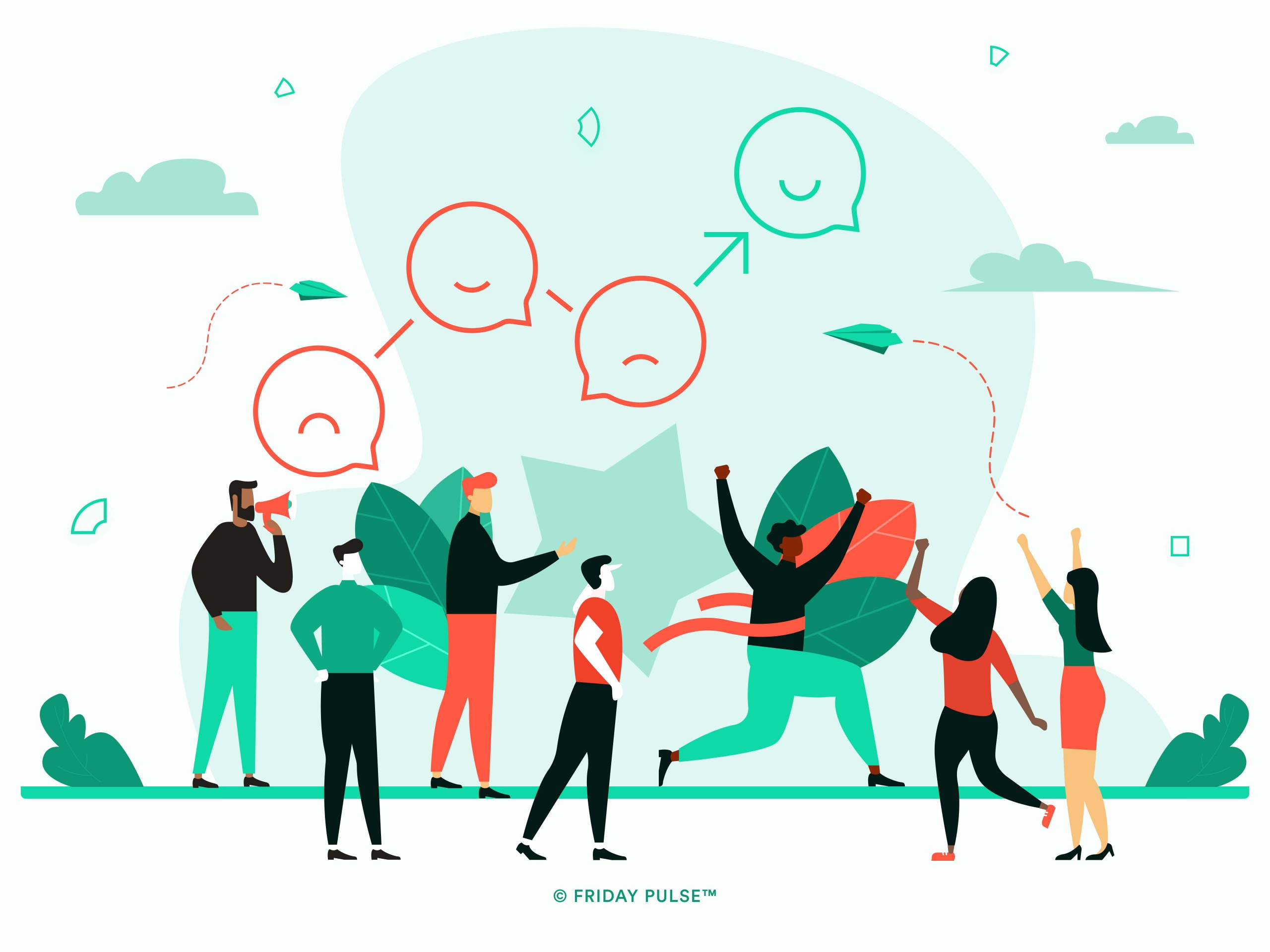A global pandemic. The collapse of supply chains. Destabilizing politics. The cry
for social justice reform. It’s been quite a year, hasn’t it?
With record numbers of people reporting symptoms of burnout at the end
of 2020, self-care has become a top priority. McKinsey have called it
an ‘epidemic of stress’ with COVID as the tipping point. The whole world is
tired. Yet, in all
the fatigue and anger, there has been a lot of innovation.
At Friday Pulse, we’re humbled to accompany tech businesses, global
giants, the NHS, schools and NGOs through a year that has tested their
ability to pivot multiple times to survive.
This week, our article sums up what we’ve learned, and what we think
organizations should hold onto post-pandemic. A crisis is always an
opportunity, and there
are a few lessons we’ve picked up this year on self-care and trust that
we can apply to 2021.
How can we improve self-care at work?
Stamina and adrenaline in a crisis
When the pandemic first hit, we made adrenaline-fuelled changes to the
way we work. When the pandemic dragged on, the adrenaline response was
the wrong tool for the job — a sprint for what had become a marathon.
While adrenaline is powerful in dealing with a crisis, it leads to
burnout if applied to a long-term problem. Long-term resilience requires
stamina, and we need a lot of stamina to handle a problem like a
pandemic.
We’re only able to create stamina by restoring and re-energizing. There
are micro-opportunities that we can take advantage of to restore
ourselves in our daily lives. These small moments are a chance to create
new habits that will sustain us.
Micro-rituals to restore
To combat eroding work-life balance, establish micro-rituals to restore
yourself. These can be end of day rituals like turning off the work
computer, hugging a loved one or hiding your phone until the next day.
Without a commute to mark the end of the workday, we need to establish
our own rituals to transition out of work into the rest of our lives.
Restorative and cognitive breaks
Does this sound familiar to you? When you take a short break from work,
you end up scrolling through the news on your phone or reading articles
on different blogs. Unfortunately, these ‘breaks’ do nothing to restore
us or build our stamina. Our brains are still active. It’s still mental
work. When we switch from one task to another task — it’s still
working — you’re just switching from ‘work work’ to ‘life work’.
The parasympathetic nervous system is responsible for helping us
restore. It kicks in
when we are still and breathing deeply, which is part of why meditation
is so powerful in wellbeing. Yet it cannot restore us when we keep
ourselves occupied with a thousand distractions. Maintaining high levels
of focus has a cost on our bodies — drawing on vitamins, minerals and
energy reserved for other functions.
Unplugging from the digital world for a few minutes is the best way to
take a break. You might go outside, get some fresh air or move your body
differently. It helps to get out into nature to reduce anxiety and help
us feel calm.
It also helps to take a break before we think we need one. Studies
have shown we’re bad at making decisions about our wellbeing when we
need rest. When we’re
all wrapped up in work, it can feel easier to keep going rather than
give up. When we most need a break, we least want it.
Yet when we go back to work after a restorative break, we’re sharper
than we were before. Through creating a different energy in the body, we
create a different energy in the mind. And this is how we find our
stamina.
How do we, as organizations, trust our people more?
For many organizations, 2020 came down to a question of trust: do we
trust our people to do their jobs without them physically being in the
office? Can we trust our employees without constant monitoring?
Often that answer was a forced “yes” — especially at the beginning.
Employers had no choice but to let their people work on their own terms.
But, some companies have reined back that trust and reverted to the way
things were pre-COVID. This strategy may offer some comfort in the
short-term – especially for command-and-control styles of leadership —
but will, ultimately, undo culture and performance in the near future.
The pandemic has taught us people can effectively work from home while
retaining productivity. Our collective consciousness about what’s
possible for flexible working has fundamentally shifted. Companies must
make concessions for remote work; otherwise, employees will find new
employers that have.
Trust your people to get the job done without monitoring them
Trusting people can feel like a leap of faith to leaders. Because of the
brain’s negativity bias, we don’t think of all the people we have
successfully trusted. Instead, we focus on the people that have broken
our trust.
When companies trust flexible working, it’s a nurturing feeling for
employees. Social ambiguity (like the kind we have in a workplace
without trust) is difficult for the brain to manage; it causes stress,
anxiety and depression. In the absence of ambiguity, where we feel
flexible working is culturally celebrated, it’s much easier to get on
with what we need to do.
Be flexible about meetings
Meetings are both necessary and an energy drain. They help facilitate
work and create more work. We need to get clever and intentional about
meetings in 2021. Organizations are doing better where leaders are
encouraging people to be flexible about how they meet.
In days of Zoom fatigue introduce ‘walking meetings’ in the way you
would take a phone call while on a walk. Where possible, set meeting
free days or half days to encourage people to progress their projects.
And signal how bad it is for people to bounce from Zoom to Zoom. It’s
not okay for colleagues to stay glued to one spot on the sofa, with a
total step count of 200 for the day.
Celebrate outcomes, not hours
It’s challenging to switch from a productivity-based business model to
an outcomes-based practice. However, the transition is easier when you
reflect and celebrate successes. Assign ownership of projects to
specific team members and trust them to deliver. During weekly meetings,
encourage colleagues to celebrate their achievements. It doesn’t matter
how big or small; it helps people to see how far they’ve come.
As a result, teams become increasingly outcomes-focused – celebrating
milestones and accomplishments. This kind of energy is contagious and
self-sustaining.
Friday Pulse can help
Over the last year, we’ve talked about resiliency and wellbeing, and given tips
on how to weather the COVID-19 storm. We’re particularly proud of how our clients
have adapted their workplace and made positive change throughout the
crisis. We’ve been amazed at the strategies they’ve adopted, and the
steps taken to look after their people.



